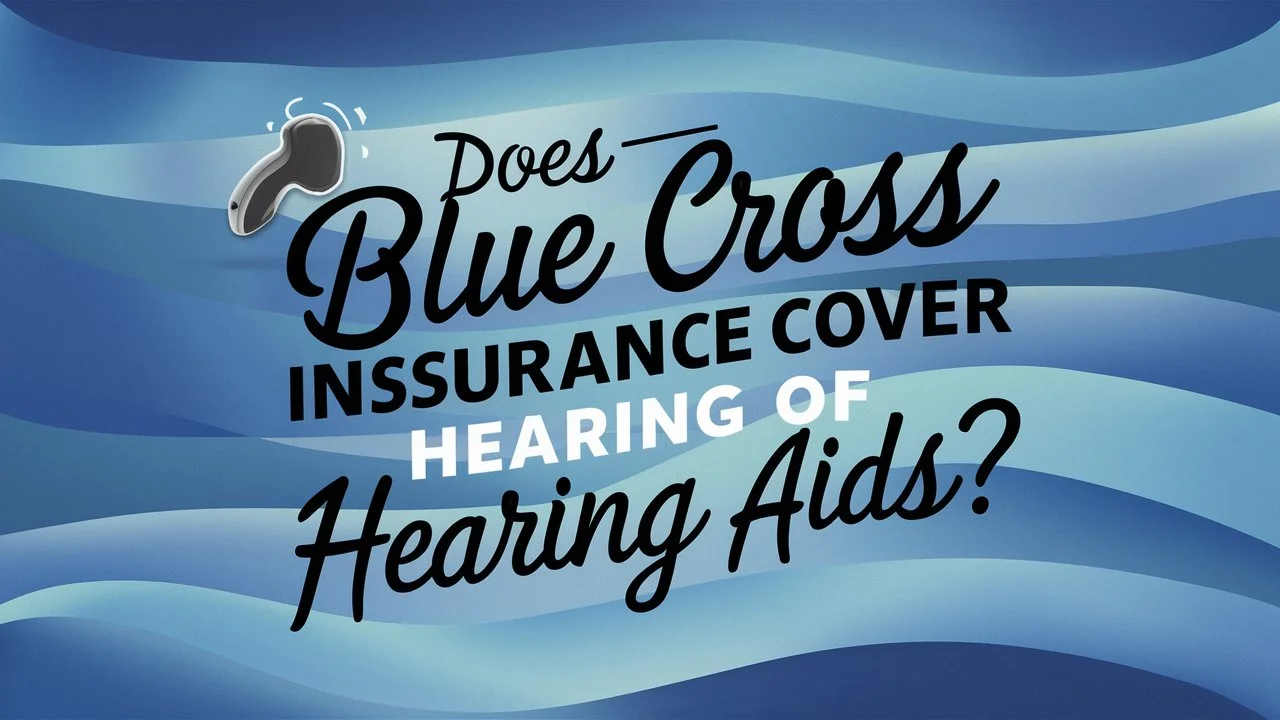Blue Cross Blue Shield is a famous health insurance company in America. It has been around for a long time.
- It started in the 1920s during the Great Depression
- At first, it just covered hospital costs to help people pay their bills
- Later, it merged with plans that covered doctor visits, too
Today, Blue Cross Blue Shield:
- It has 36 different companies across the United States
- Covers over 107 million Americans
- Offers affordable health plans as a non-profit
- Provides insurance for individuals, families, Medicare, federal employees, and employers
Does BlueCross BlueShield Insurance Offer Hearing Aid Coverage?
Hearing loss can challenge everyday conversation. If you need assistive devices, you may wonder: Does Blue Cross Hearing Aid Coverage Help Pay For Them? The answer depends on:
- Your specific Blue Cross Blue Shield (BCBS) insurance plan
- The state you live in and its mandates
- Meeting eligibility rules like degree of hearing loss
This guide explains BCBS hearing aid benefits in detail. It covers:
- What is included in typical coverage
- How to get hearing aids through your plan
- Costs you may have to pay out-of-pocket
- Tips for maximizing your hearing aid insurance coverage
What Is Covered Under Typical BCBS Hearing Aid Plans?
Blue Cross Blue Shield insurance policies can vary in their hearing aid coverage. However, most BCBS plans provide at least some benefits for hearing aids and related services. Typical coverages include:
Most Hearing Testing and Screening Programs involve hearing testing from providers entirely within the network. This diagnostic test is necessary to determine if you have hearing loss and what hearing aids will be appropriate.
Hearing Aids BCBS programs usually partially cover the cost of the hearing aids themselves. Coverage issues include:
- Types of hearing aids included (analog, digital, etc.)
- Specific models or brands that are allowed
- How often you can get new devices (such as every 3-5 years)
An audiologist or physician should prescribe hearing aids for your situation when they are medically indicated.
Your health plan usually includes a few visits with an audiologist to adjust and properly fit the latest hearing aid devices. This ensures they work correctly and are customized for your needs.
Supplies and Accessories
Plans may cover batteries, maintenance supplies, and some accessories like:
- Replacement ear molds
- Audio shoes to wirelessly stream audio
- Remote controls
Less expensive disposable items like wax guards have limited or no coverage.
Repairs and Replacements If your hearing aids break from everyday use, many BCBS plans help pay for repairs. Some also provide partial coverage to replace lost or irreparably damaged hearing aids before you are due for an upgrade.
Overview of 2024 Hearing Aid Coverage Policy for Certain Federal BCBS Plans
Some Federal BCBS Health Plans Will Cover Hearing Aids in 2024
In 2024, several Blue Cross Blue Shield health insurance plans for federal employees and retirees will start covering hearing aids. This is a new benefit for many of these plans.
Hearing loss is very common, especially as people get older. About 1 in 3 people between ages 65-74 have some hearing loss. For those over 75, it is nearly 1 in 2 people.
Hearing aids can really help people with hearing problems. They make sounds louder so people can hear better. This improves their quality of life a lot.
However, hearing aids are very expensive. A single hearing aid often costs over $2,000. Since most people need one for each ear, the total cost can be $4,000 or more.
In the past, BCBS federal plans did not provide any coverage for hearing aids. This high out-of-pocket cost prevented many people from getting the hearing help they needed.
But starting in 2024, several popular BCBS federal plans will begin offering hearing aid benefits for the first time, including:
- FEP Blue Focus
- Blue Cross Blue Shield Basic Option
- Blue Cross Blue Shield Standard Option
These plans will cover a portion of the hearing aid costs for members. There will likely still be some out-of-pocket expenses, but they will be less than paying the total price.
This policy change should allow more federal employees and retirees to access affordable hearing aids through their BCBS health insurance coverage starting next year.
Eligibility Criteria for BCBS Hearing Aid Coverage
While BCBS plans generally provide some hearing aid benefits, they also have specific requirements you must meet to be eligible for coverage. Standard eligibility criteria include:
Age Restrictions Some BCBS policies only cover hearing aid devices and services for specific age groups. For example, a plan may cover:
- Children under the age of 18 or 21
- Adults over age 65
- No age limits
Degree of Hearing Loss
You typically need to have a specified degree of hearing impairment diagnosed to qualify for coverage. Plans often use criteria like:
- Mild, moderate, severe, or profound hearing loss
- At least 40-decibel loss in one or both ears
- Loss in a specific speech frequency range
Your audiologist performs tests to assess if your hearing loss meets the plan’s criteria.
Medical Necessity BCBS policies
Usually require that hearing aids be deemed medically necessary and prescribed by a licensed provider. Hearing loss that interferes with daily function and communication qualifies.
Pre-Existing Conditions Some plans have waiting periods before covering treatment for pre-existing hearing loss. For instance, you might want to have had it for 6-12 months.
There is a common requirement for In-Network Providers to Use in-network audiologists and hearing aid suppliers. If you do not comply with this provision, your costs will be higher than they should be.
Prior Authorization
Your plan may require prior authorization or a referral before approving coverage for a hearing aid evaluation, devices, or other services.
By understanding these eligibility rules beforehand, you can determine if you meet the criteria under your specific BCBS plan. If eligible, you can follow the proper steps to obtain covered hearing aids and related care.
The Process of Getting Hearing Aids with BCBS Coverage
The Process of Getting Hearing Aids with BCBS Coverage
If you meet your plan’s eligibility rules for hearing aid benefits, you must follow specific steps to access that covered care. Here’s a look at the typical process:
Step 1: The first thing is to have your hearing examined. The exam offered by your in-network audiologist or a preferred provider is quite detailed. It is used to examine the kind and extent of hearing loss.
Step 2: If tests show that you have hearing loss that qualifies you for it, then it is a good idea to go to the audiologist so that he or she may give you a prescription for suitable hearing aids that can treat your situation as well. Examples of the prescription include:-
- Application of hearing aids (behind the ear, ear, etc.).
- Technology features needed (digital, noise reduction, etc.)
Step 3: Choose an Approved Model. Your BCBS plan covers only specific hearing aid models and brands from their approved list of devices. You’ll pick devices that match your prescription and are fully or partially covered.
Step 4: Get Fitted and Programmed
Our audiologist will have you return numerous times on demand, and then those devices will be adapted to fit you and programmed according to your ear anatomy and needs when selecting them before they are eventually appropriated to your ears and auditory requirements.
Step 5. Based on your specific plan, it may be necessary for you to have prior authorization in place before ordering the prescribed hearing aids. This involves your audiologist submitting clinical documentation.
Step 6: Purchase the Devices After prior approval, you can purchase the hearing aids from an in-network supplier/dispenser. Show your BCBS insurance card.
Step 7: Even if the supplier bills insurance, do not forget to file a claim. You may have to submit an itemized claim form to BCBS for repayment of your portion of the costs that were catered for.
Once you have completed all the proper steps, you can access your BCBS Hearing Aid Benefits and obtain the required gadgets and treatments.
Cost Considerations For Hearing Aids With BCBS Coverage
While your Blue Cross Blue Shield plan provides financial benefits for hearing aids and related services, you will likely still have some out-of-pocket costs. Here are some common cost factors to be aware of:
Deductibles and Copays Many BCBS plans have an annual deductible you must meet before hearing aid coverage kicks in. There may also be copays due at each audiologist visit.
For example:
- $500 annual deductible
- $30 copay for diagnostic hearing exam
- $50 copay for each fitting/adjustment appointment
Plans’ out-of-pocket maximums also have a yearly ceiling. When this amount is reached, the plan covers the full cost of hearing services and devices that qualify up to one hundred percent.
Hearing Aid Allowances
Rather than paying the full amount, BCBS may provide a set “hearing aid allowance” for each benefit period (often 3-5 years). For example:
- $1,000 allowance per ear for approved devices
- You pay any remaining costs above the allowance.
Non-Covered Services/Products Your plan provides limited or no coverage for certain procedures and products related to hearing aids, which you must pay out-of-pocket, such as:
- Hearing aid batteries
- Extended warranty costs
- Bluetooth/wireless streaming accessories
An employer health savings account (HSA) or a flexible savings account (FSA) is recommended for financing out-of-pocket hearing costs.
Read More: Is Lanap Covered By Insurance
Maximizing Your Blue Cross Blue Shield Coverage for Hearing Health
Tips for Getting the Most from Your BCBS Hearing Aid Benefits
Paying for tinnitus is not easy; however, there are some things that you can do to maximize the Blue Cross Blue Shield tinnitus insurance or prevent tinnitus from here. Here are some tips:
Stay In-Network
Use BCBS in-network audiology providers and approved hearing aid suppliers/dispensers. Going out-of-network means much higher out-of-pocket costs – or even no coverage in some cases.
Compare Device Options Most BCBS plans cover various hearing aid models and styles from certain approved brands and manufacturers. Compare the options to find devices that meet your needs and budget within the covered selections.
Seek Additional Discounts
Some BCBS providers or hearing aid suppliers offer added discounts or financial assistance programs for members on top of your insurance benefits. Be sure to ask about any available discounts.
Understand the Appeals Process
If BCBS initially denies coverage for a hearing aid, evaluation, or service – don’t give up! Learn the proper process for appealing the denial and providing additional clinical documentation.
Time Purchases Wisely
Many plans provide hearing aid allowances or benefits only once every few years. Time your hearing aid purchases accordingly to maximize coverage during each benefit period.
Consider Bundled Pricing
Some audiologists or suppliers offer bundled pricing that includes hearing aids, fittings, follow-ups, and a warranty in one package. This can provide better overall value.
If your employer provides you with a Health Savings Account (HSA) or Flexible Spending Account (FSA), you should utilize it to pay for hearing aids that are out of your pocket.
Check for State Mandates
In some states, health plans like BCBS are required by law to provide comprehensive hearing aid coverage for certain populations, such as children or the elderly. Know your state’s mandates.
The manufacturers’ instructions should be followed keenly on how to use and look after your hearing aids and also where to get batteries and supplies to avoid repair or replacement costs that are not required.
State Regulations and Navigating the Claims Process
Users must adhere strictly to whatever instructions the manufacturer gives concerning the use and maintenance of their hearing aids and where to find batteries and other supplies so as not to incur unnecessary repair/replacement charges. People can also utilize well their BCBS hearing aid benefits through wise actions and consumer informedness.
There are many states where people have made laws that say that companies such as Blue Cross Blue Shield have specific responsibilities regarding what they can cover regarding age-related hearing devices. For example:
- Over 20 states mandate some level of hearing aid coverage for children
- Arkansas, Connecticut, and New Mexico require plans to cover hearing aids for any member
- Other states like California, Illinois, and New Hampshire have benefit mandates for the elderly
These state-level rules override any less comprehensive coverage outlined in your BCBS plan details. Check what mandates apply for hearing aids in your state of residence.
Filing Claims with BCBS Even with insurance coverage, you may still need to submit claim forms to BCBS for reimbursement of your share of hearing aid costs. Typical claim documentation includes:
- Audiologist exam results showing hearing loss diagnosis
- Prescription and medical necessity statement for recommended devices
- Itemized bills/invoices for hearing aid products and services received
- Proof of payment for any out-of-pocket expenses
Many claims can now be filed digitally through your BCBS online member portal. Be sure to meet any claim filing deadlines.
You have appeal rights if your initial claim is denied for any reason. The denial letter outlines the process, which may involve providing additional clinical info from your doctor.
Blues on Call: When you are in doubt about coverage details or have issues with claims, you can contact the Blues on Call support line. Representatives can:
- Verify your specific hearing aid benefits
- Look up in-network audiology providers
- Assist with claims processing problems
- Start the appeals process for denials
- Explain billing codes and charges
Don’t go it alone—the Blues on Call team is there to help you navigate anything hearing aid-related with your BCBS plan.
The more you understand your state’s regulations and the BCBS claims process, the smoother it will be to access your hearing aid coverage benefits.
Conclusion
Having the appropriate hearing aids is vital for maintaining quality of life with hearing loss. While navigating insurance coverage can be tricky, this guide has provided an in-depth look at:
- What is typically covered under BCBS hearing aid benefits
- Eligibility criteria you’ll need to meet
- Detailed steps for obtaining devices through your plan
- Anticipated out-of-pocket costs to budget for
- Tips to maximize the value of your benefits
By being an informed advocate for your hearing health needs, you can take full advantage of any available BCBS insurance coverage for hearing aids. Don’t let uncertain costs prevent you from effectively treating your hearing loss.
Frequently Asked Questions
Does Blue Cross Blue Shield of IL Cover Hearing Aids?
Blue Cross Blue Shield of Illinois (BCBSIL) offers coverage for hearing aids under some of its plans, but the specifics can vary. It’s important to review your individual policy or contact BCBSIL directly to understand the coverage details. Some plans may cover a portion of the cost of hearing aids, while others may not provide coverage at all.
Does Medical Aid Cover Hearing Aids?
Medical aid or health insurance coverage for hearing aids depends on the specific plan and provider. Some medical aid plans may cover the cost of hearing aids, either fully or partially, while others may exclude hearing aids from coverage. It’s essential to check your policy details or speak with your insurance provider to determine if hearing aids are covered.
Are Hearing Aids Insured for Loss?
Hearing aids can be insured for loss, but this coverage is typically offered as an add-on or through a separate insurance policy. Some manufacturers or providers offer loss and damage coverage when you purchase hearing aids, but it’s important to verify the terms and whether it includes a one-time replacement or multiple replacements.
What Is Covered in the Cost of Hearing Aids?
The cost of hearing aids typically includes more than just the devices themselves. It often covers:
- Hearing Test: The initial assessment to determine the type and extent of hearing loss.
- Consultation and Fitting: Professional services for selecting and fitting the hearing aids.
- Follow-up Visits: Post-purchase visits to adjust the hearing aids for optimal performance.
- Warranty: A warranty that may cover repairs and sometimes loss or damage.
- Accessories: Items like batteries, cleaning tools, and storage cases might be included.
Does Blue Cross Blue Shield Cover Hearing Aids?
Blue Cross Blue Shield (BCBS) coverage for hearing aids varies by state and plan. Some BCBS plans may include coverage for hearing aids, especially for children, while others might offer discounts through partner programs rather than direct coverage. It’s crucial to review your specific plan or contact BCBS to understand what is covered under your policy.

Justin Taylor is the creative force behind Insuranted.com, a premier destination for insightful and trustworthy insurance information. With a dedication to demystifying insurance complexities, Justin strives to equip readers with the knowledge they need to make smart, informed decisions.










